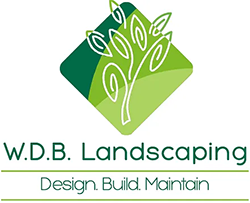FAQ
W.D.B. Landscaping Inc
Have a landscaping-related question? We have the answer. Check out these FAQs and give us a call today for more information!
-
What is hardscaping?
Hardscaping refers to the non-plant elements of landscaping, such as patios, walkways, retaining walls, decks, fences, and other structures made from materials like stone, concrete, wood, or metal. If you're looking for a hardscaping contractor, call us at W.D.B. Landscaping Inc today!
-
Why should I invest in hardscaping?
Hardscaping can enhance your outdoor living space, increase property value, reduce maintenance costs (compared to lawns and gardens), and create functional areas for entertaining, relaxation, or other activities. Contact our team today if you're in need of a hardscaping contractor.
-
What materials are typically used in hardscaping?
Common materials include pavers, concrete, natural stone (such as flagstone or granite), wood, brick, gravel, and metal. Each has its benefits in terms of durability, aesthetics, and cost. Call us today if you're looking for a hardscaping contractor.
-
How do I choose the right materials for my hardscape project?
Consider factors like the overall style of your home and garden, climate conditions (freeze-thaw cycles, rainfall), your budget, and how much maintenance you're willing to perform. Consult with a professional hardscaping contractor to make sure the materials are suitable for your project’s needs.
-
Can hardscaping increase the value of my home?
Yes, well-designed hardscaping can significantly increase curb appeal and property value by creating attractive, functional outdoor spaces that appeal to potential buyers. According to This Old House, in 2023, standard lawn care maintenance service has a cost recovery of 217%. To discuss your project with a professional hardscaping contractor, call us today.
-
How long does a hardscaping project typically take?
The duration depends on the scope of the project. A simple walkway or patio may take us a few days, while more complex installations like retaining walls or outdoor kitchens could take several weeks. For more information or to get in touch with a hardscaping contractor, call our team today.
-
Is hardscaping maintenance-free?
While hardscaping requires less maintenance than plant-based landscaping, it still needs some care. Regular cleaning, sealing (for certain materials like pavers or concrete), and occasional repairs may be needed to maintain the appearance and longevity. Call us today if you need a hardscaping contractor.
-
Can I install hardscaping myself or should I hire a professional?
Small projects like laying a simple patio or creating a garden border can be DIY-friendly, but larger projects or complex installations (like retaining walls, drainage systems, or intricate designs) should be handled by professionals to ensure proper construction and safety. To get started with a professional hardscaping contractor, call our team today!
-
How much does hardscaping cost?
Costs vary depending on the materials used, the size and complexity of the project, and your location. Generally, prices can range from $10 to $50 or more per square foot, with more intricate designs and premium materials driving up the cost in our experience. Call us today if you need a hardscaping contractor.
-
Can hardscaping help with drainage issues?
Yes, properly designed hardscaping, such as grading and incorporating drainage solutions like French drains or permeable pavers, can improve water flow and prevent flooding or erosion on your property. Call us today if you're looking for a reliable hardscaping contractor.
-
What is turf care, and why is it important?
Turf care involves maintaining the health and appearance of grass lawns, including mowing, fertilizing, aerating, and watering. Proper turf care ensures a lush, green lawn and helps prevent issues like weeds, pests, and diseases.
-
What’s the best way to water my lawn?
Lawns typically need about 1 inch of water per week. Early morning is the best time to water, as it allows the grass to dry before nightfall, preventing fungal growth. Water deeply and less frequently to encourage strong root growth.
-
What is aeration, and does my lawn need it?
Aeration involves perforating the soil to allow air, water, and nutrients to reach the grassroots. It’s recommended to aerate once a year, especially if your soil is compacted or your lawn gets heavy foot traffic.
-
How can I prevent weeds in my turf?
Weed prevention begins with a healthy lawn. Regular mowing, proper watering, and fertilization help grass grow thick and crowd out weeds. In some cases, pre-emergent herbicides may also be used in early spring to prevent weed seeds from sprouting
-
What are the signs of turf disease, and how can I treat it?
Signs of turf disease include yellowing or brown patches, unusual growth patterns, or moldy spots. Proper watering practices, aeration, and timely fertilization can help, but if disease persists, consult a lawn care professional for appropriate treatment options.
-
Should I use organic or synthetic fertilizers for my lawn?
Both organic and synthetic fertilizers can work effectively, but they have different impacts on the environment. Organic fertilizers improve soil health over time, while synthetic fertilizers provide quicker results. Your choice depends on your preferences and lawn needs
-
Can I renovate my lawn if it’s looking unhealthy or sparse?
Yes! Lawn renovation includes overseeding, aeration, and fertilization to restore and enhance your turf’s health. A lawn care professional can help you determine the best approach for your lawn's specific issues

Share On: